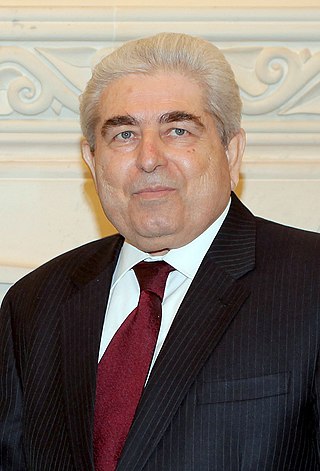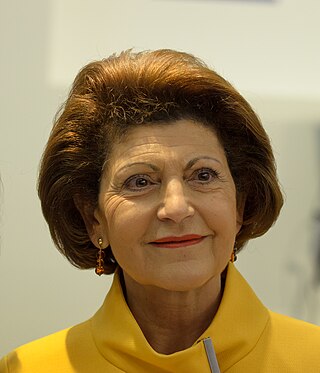| |||||
| Decades: | |||||
|---|---|---|---|---|---|
| See also: | Other events in 1964 · Timeline of Cypriot history | ||||
Events in the year 1964 in Cyprus .
| |||||
| Decades: | |||||
|---|---|---|---|---|---|
| See also: | Other events in 1964 · Timeline of Cypriot history | ||||
Events in the year 1964 in Cyprus .

Human habitation of Cyprus dates back to the Paleolithic era. Cyprus's geographic position has caused the island to be influenced by differing Eastern Mediterranean civilisations over the millennia.

Rauf Raif Denktaş was a Turkish Cypriot politician, barrister and jurist who served as the founding president of Northern Cyprus. He occupied this position as the president of the Turkish Republic of Northern Cyprus between the declaration of the de facto state by Denktaş in 1983 and 2005, as the president of the Turkish Federated State of Cyprus between 1975 and 1983 and as the president of the Autonomous Turkish Cypriot Administration between 1974 and 1975. He was also elected in 1973 as the vice-president of the Republic of Cyprus.

The United Nations Peacekeeping Force in Cyprus (UNFICYP) is a United Nations peacekeeping force that was established under United Nations Security Council Resolution 186 in 1964 to prevent a recurrence of fighting following intercommunal violence between the Greek Cypriots and Turkish Cypriots, to contribute to the maintenance and restoration of law and order and to facilitate a return to normal conditions. Major General Ingrid Gjerde is the current Force Commander of UNFICYP, appointed in 2021, and preceded by Cheryl Pearce (Australia). Assistant Police Commissioner Satu Koivu (Finland) is the current Senior Police Adviser appointed in 2021.

Cyprus was part of the British Empire, under military occupation from 1914 to 1925, and a Crown colony from 1925 to 1960. Cyprus became an independent nation in 1960.

The Turkish invasion of Cyprus began on 20 July 1974 and progressed in two phases over the following month. Taking place upon a background of intercommunal violence between Greek and Turkish Cypriots, and in response to a Greek junta-sponsored Cypriot coup d'état five days earlier, it led to the Turkish capture and occupation of the northern part of the island.

Demetris Christofias was a Cypriot politician, who served President of Cyprus from 2008 to 2013. He was previously President of the House of Representatives from 2001 to 2008 and General Secretary of the Progressive Party of Working People from 1988 to 2009.

The House of Representatives is the national unicameral legislature of the Republic of Cyprus. Members and three observers representing Armenian, Latin, and Maronite Cypriots are elected by proportional representation every five years. 30% of seats are allocated to Turkish Cypriots, but these have been vacant since 1964. The House of Representatives of Cyprus is the only legislature in the European Union within a fully presidential system.

United Nations Security Council Resolution 186, adopted unanimously on 4 March 1964 during the Cyprus crisis of 1963–64, calling on all member states to conform to their obligations under the Charter, asked the Government of Cyprus to take all additional measures necessary to stop violence and bloodshed and called on communities in Cyprus and their leaders to act with restraint. The resolution then recommend the creation of a peace-keeping force in the interest of preserving international peace and to prevent a recurrence of fighting and that, in agreement with the Governments of Greece, Turkey and the United Kingdom, a mediator would be appointed to try to promote a peaceful solution to the problem confronting Cyprus.

Foreign relations between Cyprus and the United Kingdom are positive. Cyprus gained its independence from the United Kingdom in 1960, after 82 years of British control; the two countries now enjoy warm relations, though the continuing British sovereignty of Akrotiri and Dhekelia in Cyprus continues to divide Cypriots. The countries are both members of the United Nations and Commonwealth of Nations.

Androulla Vassiliou is a Cypriot and European politician. Between March 2008 and February 2010, she was the European Commissioner for Health, and then, until November 2014, the European Commissioner for Education, Culture, Multilingualism and Youth. Vassiliou is very active in social and cultural fields particularly within the UN and EU. In Cyprus she has held many important posts and is on the Board of many public and private companies.

United Nations Security Council resolution 839, adopted unanimously on 11 June 1993, noted a report of the Secretary-General that, due to the existing circumstances, the presence of the United Nations Peacekeeping Force in Cyprus (UNFICYP) would continue to be essential for a peaceful settlement. The Council asked the Secretary-General to report back again before 15 November 1993, to follow the implementation of the resolution.
Bloody Christmas, in Turkish Cypriot and Turkish historiography, refers to the resumption of intercommunal violence between the Greek Cypriots and the Turkish Cypriots during the Cyprus crisis of 1963–64, on the night of 20–21 December 1963 and the subsequent period of island-wide violence amounting to civil war. This initial episode of violence lasted until 31 December and was somewhat subdued with the start of peace talks at the London Conference, but outbursts of violence continued thereafter. The violence precipitated the end of Turkish Cypriot representation in the Republic of Cyprus.
Events in the year 1986 in Cyprus.
Events in the year 1984 in Cyprus.
Events in the year 1982 in Cyprus.
Events in the year 1980 in Cyprus.
Events in the year 1979 in Cyprus.
Events in the year 1978 in Cyprus.
Events in the year 1977 in Cyprus.
Events in the year 1965 in Cyprus.